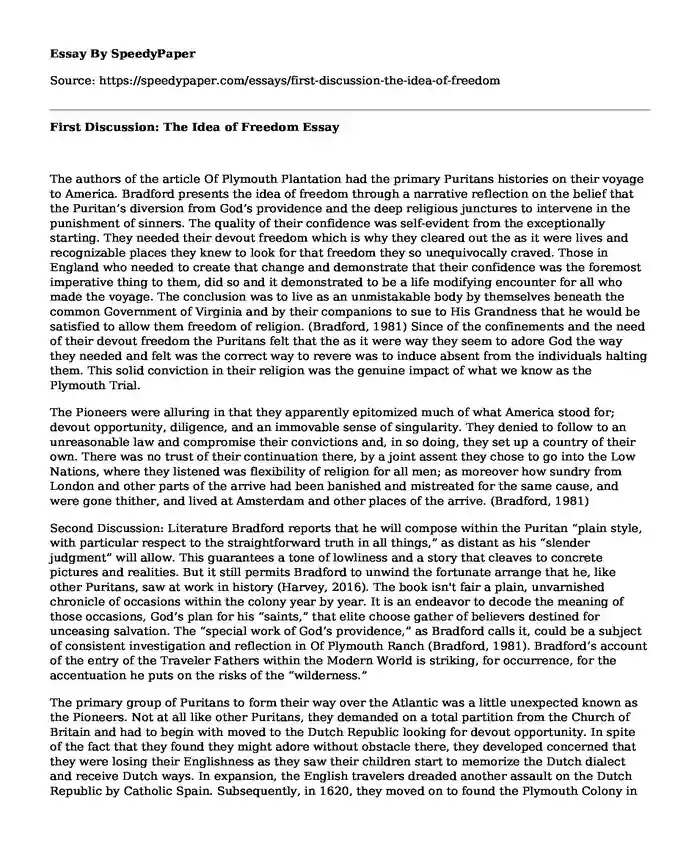The authors of the article Of Plymouth Plantation had the primary Puritans histories on their voyage to America. Bradford presents the idea of freedom through a narrative reflection on the belief that the Puritan's diversion from God's providence and the deep religious junctures to intervene in the punishment of sinners. The quality of their confidence was self-evident from the exceptionally starting. They needed their devout freedom which is why they cleared out the as it were lives and recognizable places they knew to look for that freedom they so unequivocally craved. Those in England who needed to create that change and demonstrate that their confidence was the foremost imperative thing to them, did so and it demonstrated to be a life modifying encounter for all who made the voyage. The conclusion was to live as an unmistakable body by themselves beneath the common Government of Virginia and by their companions to sue to His Grandness that he would be satisfied to allow them freedom of religion. (Bradford, 1981) Since of the confinements and the need of their devout freedom the Puritans felt that the as it were way they seem to adore God the way they needed and felt was the correct way to revere was to induce absent from the individuals halting them. This solid conviction in their religion was the genuine impact of what we know as the Plymouth Trial.
The Pioneers were alluring in that they apparently epitomized much of what America stood for; devout opportunity, diligence, and an immovable sense of singularity. They denied to follow to an unreasonable law and compromise their convictions and, in so doing, they set up a country of their own. There was no trust of their continuation there, by a joint assent they chose to go into the Low Nations, where they listened was flexibility of religion for all men; as moreover how sundry from London and other parts of the arrive had been banished and mistreated for the same cause, and were gone thither, and lived at Amsterdam and other places of the arrive. (Bradford, 1981)
Second Discussion: Literature Bradford reports that he will compose within the Puritan "plain style, with particular respect to the straightforward truth in all things," as distant as his "slender judgment" will allow. This guarantees a tone of lowliness and a story that cleaves to concrete pictures and realities. But it still permits Bradford to unwind the fortunate arrange that he, like other Puritans, saw at work in history (Harvey, 2016). The book isn't fair a plain, unvarnished chronicle of occasions within the colony year by year. It is an endeavor to decode the meaning of those occasions, God's plan for his "saints," that elite choose gather of believers destined for unceasing salvation. The "special work of God's providence," as Bradford calls it, could be a subject of consistent investigation and reflection in Of Plymouth Ranch (Bradford, 1981). Bradford's account of the entry of the Traveler Fathers within the Modern World is striking, for occurrence, for the accentuation he puts on the risks of the "wilderness."
The primary group of Puritans to form their way over the Atlantic was a little unexpected known as the Pioneers. Not at all like other Puritans, they demanded on a total partition from the Church of Britain and had to begin with moved to the Dutch Republic looking for devout opportunity. In spite of the fact that they found they might adore without obstacle there, they developed concerned that they were losing their Englishness as they saw their children start to memorize the Dutch dialect and receive Dutch ways. In expansion, the English travelers dreaded another assault on the Dutch Republic by Catholic Spain. Subsequently, in 1620, they moved on to found the Plymouth Colony in present-day Massachusetts. The senator of Plymouth, William Bradford, was a Separatist, a defender of total partition from the English state church. Bradford and the other Traveler Separatists spoke to a major challenge to the winning vision of a bound together English national church and domain (Harvey, 2016).
The survival of the Puritans amid and after the long voyage to the Modern World has seen as a portion of the divine arrange. For Bradford, America was no favored plant initially, but the civilizing mission of himself and his colony was to create it one: to turn it into proof of their race and God's boundless control and benevolence. This slant or have to see history in fortunate terms set up curiously pressures and has powerful results, in Bradford's book and comparative Puritan accounts. Of Plymouth Ranch incorporates, because it must, numerous stories of human blunder and evil, and Bradford frequently has colossal trouble in clarifying fair how they shape portion of God's plan.
References
Bradford, William. (1981). Of Plymouth Plantation 1620-1647. New York: The Modern Library.
Harvey, Sean P. (2016). Early National History, Slavery, and Abolition, Native American History, African American History. DOI: 10.1093/acrefore/9780199329175.013.262
Cite this page
First Discussion: The Idea of Freedom. (2023, Jan 09). Retrieved from https://speedypaper.com/essays/first-discussion-the-idea-of-freedom
Request Removal
If you are the original author of this essay and no longer wish to have it published on the SpeedyPaper website, please click below to request its removal:
- Free Essay Containing Art History Reading Comprehension
- Nutrition Essay Example: Protein Intake and Nitrogen Balance
- Free Essay: Influence of Native American Religions on the Religiosity of New World Settlers
- Free Essay Answering Why You Need to Visit London Parliament at Least Once
- Literature Review Example on Success Rate of Startups in India
- Essay Sample: E-learning vs. Traditional Education
- Recommendations for Initial Production Capacity in Hong Kong
Popular categories





